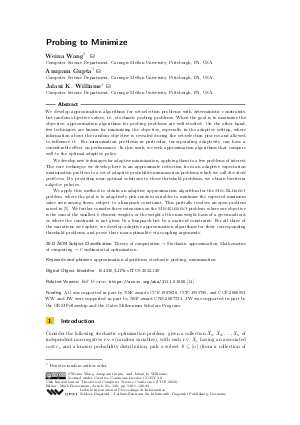Probing to Minimize
Authors Weina Wang, Anupam Gupta, Jalani K. Williams
-
Part of:
Volume:
13th Innovations in Theoretical Computer Science Conference (ITCS 2022)
Part of: Series: Leibniz International Proceedings in Informatics (LIPIcs)
Part of: Conference: Innovations in Theoretical Computer Science Conference (ITCS) - License:
 Creative Commons Attribution 4.0 International license
Creative Commons Attribution 4.0 International license
- Publication Date: 2022-01-25
File

PDF
LIPIcs.ITCS.2022.120.pdf
- Filesize: 1.02 MB
- 23 pages
Document Identifiers
Related Versions
- Full Version https://arxiv.org/abs/2111.01955
Subject Classification
ACM Subject Classification
- Theory of computation → Stochastic approximation
- Mathematics of computing → Combinatorial optimization
Keywords
- approximation algorithms
- stochastic probing
- minimization
Metrics
- Access Statistics
-
Total Accesses (updated on a weekly basis)
0Document
0Metadata
Abstract
We develop approximation algorithms for set-selection problems with deterministic constraints, but random objective values, i.e., stochastic probing problems. When the goal is to maximize the objective, approximation algorithms for probing problems are well-studied. On the other hand, few techniques are known for minimizing the objective, especially in the adaptive setting, where information about the random objective is revealed during the set-selection process and allowed to influence it. For minimization problems in particular, incorporating adaptivity can have a considerable effect on performance. In this work, we seek approximation algorithms that compare well to the optimal adaptive policy. We develop new techniques for adaptive minimization, applying them to a few problems of interest. The core technique we develop here is an approximate reduction from an adaptive expectation minimization problem to a set of adaptive probability minimization problems which we call threshold problems. By providing near-optimal solutions to these threshold problems, we obtain bicriteria adaptive policies. We apply this method to obtain an adaptive approximation algorithm for the Min-Element problem, where the goal is to adaptively pick random variables to minimize the expected minimum value seen among them, subject to a knapsack constraint. This partially resolves an open problem raised in [Goel et al., 2010]. We further consider three extensions on the Min-Element problem, where our objective is the sum of the smallest k element-weights, or the weight of the min-weight basis of a given matroid, or where the constraint is not given by a knapsack but by a matroid constraint. For all three of the variations we explore, we develop adaptive approximation algorithms for their corresponding threshold problems, and prove their near-optimality via coupling arguments.
Cite As Get BibTex
Weina Wang, Anupam Gupta, and Jalani K. Williams. Probing to Minimize. In 13th Innovations in Theoretical Computer Science Conference (ITCS 2022). Leibniz International Proceedings in Informatics (LIPIcs), Volume 215, pp. 120:1-120:23, Schloss Dagstuhl – Leibniz-Zentrum für Informatik (2022)
https://doi.org/10.4230/LIPIcs.ITCS.2022.120
BibTex
@InProceedings{wang_et_al:LIPIcs.ITCS.2022.120,
author = {Wang, Weina and Gupta, Anupam and Williams, Jalani K.},
title = {{Probing to Minimize}},
booktitle = {13th Innovations in Theoretical Computer Science Conference (ITCS 2022)},
pages = {120:1--120:23},
series = {Leibniz International Proceedings in Informatics (LIPIcs)},
ISBN = {978-3-95977-217-4},
ISSN = {1868-8969},
year = {2022},
volume = {215},
editor = {Braverman, Mark},
publisher = {Schloss Dagstuhl -- Leibniz-Zentrum f{\"u}r Informatik},
address = {Dagstuhl, Germany},
URL = {https://drops.dagstuhl.de/entities/document/10.4230/LIPIcs.ITCS.2022.120},
URN = {urn:nbn:de:0030-drops-157169},
doi = {10.4230/LIPIcs.ITCS.2022.120},
annote = {Keywords: approximation algorithms, stochastic probing, minimization}
}
Author Details
Funding
AG was supported in part by NSF awards CCF-1907820, CCF-1955785, and CCF-2006953. WW and JW were supported in part by NSF award CNS-2007733. JW was supported in part by the GEM Fellowship and the Gates Millennium Scholars Program.
References
- Marek Adamczyk, Maxim Sviridenko, and Justin Ward. Submodular stochastic probing on matroids. In Int. Symp. on Theoretical Aspects of Computer Science (STACS), pages 29-40, Lyon, France, 2014. URL: https://doi.org/10.4230/LIPIcs.STACS.2014.29.
- Domagoj Bradac, Sahil Singla, and Goran Zuzic. (Near) Optimal Adaptivity Gaps for Stochastic Multi-Value Probing. In Approximation, Randomization, and Combinatorial Optimization. Algorithms and Techniques (APPROX/RANDOM), volume 145, pages 49:1-49:21, Boston, MA, 2019. URL: https://doi.org/10.4230/LIPIcs.APPROX-RANDOM.2019.49.
-
Robert L. Carraway, Robert L. Schmidt, and Lawrence R. Weatherford. An algorithm for maximizing target achievement in the stochastic knapsack problem with normal returns. Nav. Res. Log., 40(2):161-173, 1993.

- Alina Ene, Viswanath Nagarajan, and Rishi Saket. Approximation algorithms for stochastic k-TSP. In IARCS Ann. Conf. on Foundations of Software Technology and Theoretical Computer Science (FSTTCS), Kanpur, India, 2017. URL: https://doi.org/10.4230/LIPIcs.FSTTCS.2017.27.
- Ashish Goel, Sudipto Guha, and Kamesh Munagala. How to probe for an extreme value. ACM Trans. Algorithms, 7(1):12:1-12:20, December 2010. URL: https://doi.org/10.1145/1868237.1868250.
- Daniel Golovin and Andreas Krause. Adaptive submodularity: Theory and applications in active learning and stochastic optimization. J.Artif. Int. Res., 42:427-486, 2011. URL: https://dl.acm.org/doi/10.5555/2208436.2208448.
- Sudipto Guha and Kamesh Munagala. Approximation algorithms for budgeted learning problems. In Proc. Ann. ACM Symp. Theory of Computing (STOC), pages 104-113, San Diego, CA, 2007. URL: https://doi.org/10.1145/1250790.1250807.
- Anupam Gupta, Viswanath Nagarajan, and Sahil Singla. Adaptivity gaps for stochastic probing: Submodular and XOS functions. In ACM-SIAM Symp. on Discrete Algorithms (SODA), pages 1688-1702, Barcelona, Spain, 2017. URL: https://doi.org/10.5555/3039686.3039797.
- Anupam Gupta, Viswanath Nagarajan, and Sahil Singla. Algorithms and adaptivity gaps for stochastic probing. In ACM-SIAM Symp. on Discrete Algorithms (SODA), pages 1731-1747, Barcelona, Spain, 2017. URL: https://doi.org/10.1137/1.9781611974782.111.
- Taylan Ilhan, Seyed MR Iravani, and Mark S Daskin. The adaptive knapsack problem with stochastic rewards. Oper. Res., 59(59):242-248, 2011. URL: https://doi.org/10.1287/opre.1100.0857.
- Haotian Jiang, Jian Li, Daogao Liu, and Sahil Singla. Algorithms and Adaptivity Gaps for Stochastic k-TSP. In Innovations in Theoretical Computer Science Conference (ITCS), volume 151, pages 45:1-45:25, Seattle, Washington, 2020. URL: https://doi.org/10.4230/LIPIcs.ITCS.2020.45.
-
W. Rudin. Principles of Mathematical Analysis. International series in pure and applied mathematics. McGraw-Hill, 1976.

- Sahil Singla. The price of information in combinatorial optimization. In ACM-SIAM Symp. on Discrete Algorithms (SODA), pages 2523-2532, 2018. URL: https://doi.org/10.1137/1.9781611975031.161.
- Weina Wang, Anupam Gupta, and Jalani Williams. Probing to minimize, 2021. URL: http://arxiv.org/abs/2111.01955.
